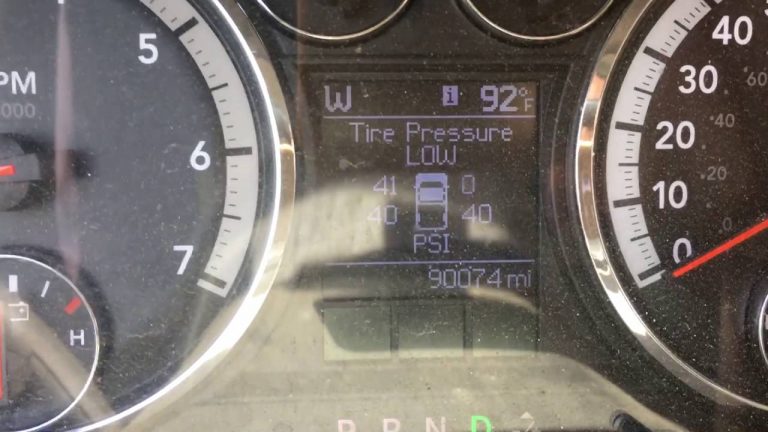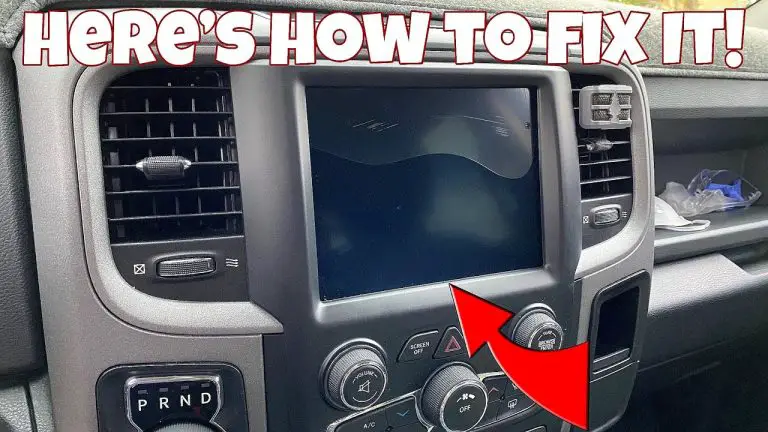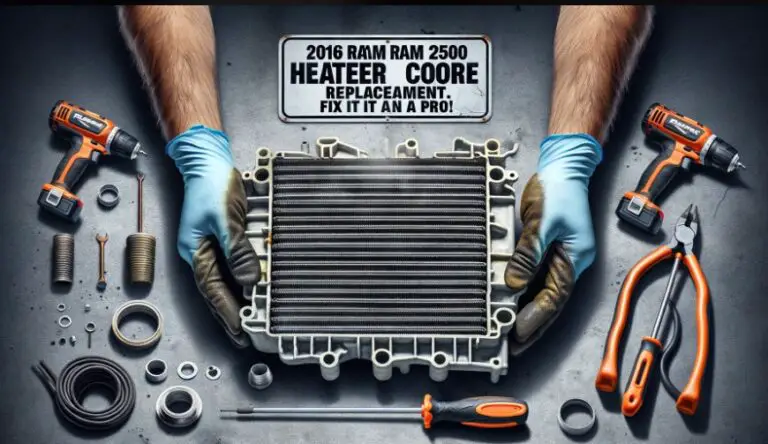Dodge Ram Climate Control Problems: Your Complete Guide!
Dodge Ram trucks are renowned for their robustness and reliability. However, like any vehicle, they can encounter issues, particularly with the climate control system.
These problems can range from inconsistent airflow and temperature control difficulties to more complex issues involving the HVAC control module.
Addressing these issues is not just about ensuring a comfortable driving experience; it’s also crucial for the overall functionality and longevity of your truck.
In this article, we will cover:
- Common issues and their symptoms.
- Step-by-step troubleshooting and DIY fixes.
- When to opt for professional repair services.
- Preventive tips to keep your system running smoothly.
- Cost Analysis: Repairing Climate Control Problems.
- Latest Advances in Dodge Ram Climate Control Technology.
Ready to get your Dodge Ram’s climate control functioning flawlessly again? Let’s dive in.
4 Most Common Climate Control Issues in Dodge Rams
Dodge Ram trucks are subject to a range of climate control issues that can impact the comfort and functionality of the vehicle.
Understanding these common problems can help in timely diagnosis and repair. Here are some key issues that Dodge Ram owners may encounter:
1. Refrigerant Leaks
- Symptom: The air conditioning system fails to cool the cabin effectively.
- Potential Causes: Leaks can occur in various parts of the system, such as the evaporator, condenser, or hoses. These leaks prevent the refrigerant from circulating properly, reducing the system’s cooling efficiency.
2. Air Conditioning Compressor Issues
- Symptom: Lack of cold air blowing from the AC vents.
- Potential Cause: A faulty compressor is often responsible for this issue. The compressor is crucial for circulating refrigerant and without it functioning properly, the AC system fails to cool.
3. Electrical Climate Control Issues
- Symptom: Inconsistent air temperature or airflow, with the blend door actuator not opening or closing fully.
- Potential Cause: Electrical problems can lead to malfunctioning of the blend door actuator, a component that regulates the mix of hot and cold air.
4. Overheating
- Symptoms: The engine running hotter than usual, possibly accompanied by a temperature warning light.
- Potential Causes:
- Low Coolant: Insufficient coolant can lead to poor engine cooling.
- Cooling System Leaks: Leaks in the cooling system components, like hoses or radiators, can cause coolant loss and overheating.
- Broken Water Pump: A malfunctioning water pump fails to circulate coolant effectively.
- Radiator Issues: Obstructions or damage in the radiator can impede cooling.
- Low Oil: Oil plays a part in engine cooling; low levels can contribute to overheating.
- Thermostat Failure: A stuck or broken thermostat can prevent proper coolant flow.
- Plugged Heater Core: A clogged heater core can affect both heating and cooling functions.
5. Plugged Heater Core
- Symptom: Inadequate heating or windshield defrosting.
- Potential Cause: A blocked heater core prevents hot coolant from passing through, thus failing to heat the cabin air.
Understanding these issues is the first step in resolving them. The next section will guide you through troubleshooting steps specific to these problems.
Troubleshooting Steps for Climate Control Problems
Addressing climate control issues in your Dodge Ram requires a thorough understanding of the system and careful troubleshooting. Here’s a detailed guide to help you diagnose and repair common problems.

Refrigerant Leaks
- Inspection Procedure:
- Visual Inspection: Look for signs of leaks, such as oily residues on the AC components, including the evaporator, condenser, and hoses. This residue often indicates where the refrigerant is escaping.
- Use of Leak Detection Dye: If the leak is not visible, adding a fluorescent dye to the refrigerant can help identify the exact location of the leak.
- Repair Steps:
- Sealing and Replacing Components: If a small leak is found, it might be possible to seal it. However, larger leaks or damaged components will require replacement.
- Recharging the System: After repairs, the AC system needs to be vacuumed and recharged with the correct type and amount of refrigerant, as specified by the manufacturer.
Air Conditioning Compressor Issues
- Diagnostic Checks:
- Listen for Noises: A failing compressor often makes unusual noises, such as grinding or squealing, indicating internal wear or damage.
- Clutch Engagement: Check if the compressor’s clutch is engaging properly. The clutch should click and engage when the AC is turned on.
- Repair Process:
- Compressor Replacement: If diagnosed with internal damage or failure, the compressor must be replaced. This involves removing the old compressor, installing a new one, and then recharging the AC system.
- Expert Evaluation: Given the complexity, it’s recommended to have this repair done by a professional to ensure it’s correctly executed.
Electrical Climate Control Issues
- Blend Door Actuator Check:
- Operational Test: Activate the climate control system and listen for the actuator. It should move smoothly without any jerky motions or strange noises.
- Electrical System Diagnosis:
- Wiring Inspection: Examine the wiring and connectors for any signs of damage, corrosion, or loose connections.
- Continuity Test: Use a multimeter to check for continuity in the electrical circuit. Any breaks in continuity indicate a wiring problem.
Overheating
- Coolant and System Check:
- Level and Quality: Ensure the coolant level is adequate and the coolant is in good condition. Old or contaminated coolant should be replaced.
- System Inspection: Look for any leaks or damage to the radiator, hoses, and water pump.
- Thermostat Testing: A thermostat stuck in the closed position can cause overheating and should be tested for proper operation.
- Oil Level Verification:
- Check Oil Level: Low engine oil can exacerbate overheating. Verify that the oil level is within the recommended range.
Plugged Heater Core
- Inspection and Diagnosis:
- Airflow Test: Check if warm air is flowing properly through the vents when the heater is on. Restricted airflow can indicate a clogged heater core.
- Coolant Flow Check: Inspect the heater core hoses for equal warmth; a cooler hose could suggest a blockage.
- Flushing the Heater Core:
- Disconnect Hoses: Remove the heater core hoses and use a garden hose to flush out any debris or blockage. This should be done with caution to avoid damaging the core.
Each step in this troubleshooting guide requires specific tools and a certain level of mechanical expertise. If you’re not comfortable performing these tasks, it’s advisable to seek professional assistance to avoid causing further damage to the system.
DIY Fixes vs. Professional Assistance
When facing climate control issues in your Dodge Ram, it’s important to weigh the options between attempting a DIY fix and seeking professional help. Here’s a guide to help you make an informed decision.
When to Attempt a DIY Fix
- Basic Issues: Simple problems like replacing cabin air filters or checking coolant levels can often be done at home with basic tools.
- Clear Instructions Available: If you have clear, step-by-step instructions (like for a climate control reset) and are comfortable following them, a DIY approach can be viable.
- Minor Electrical Work: Replacing fuses or checking electrical connections can be done at home, provided you have the right tools and basic knowledge of vehicle electrical systems.
DIY Considerations
- Safety First: Always prioritize safety. If you’re unsure about a procedure or don’t have the proper safety equipment, it’s best to avoid attempting it.
- Tool Availability: Ensure you have the necessary tools for the job. Some repairs might require specialized tools not typically found in a standard toolbox.
- Time and Effort: Consider if you have the time and patience for the repair. Some fixes might be more time-consuming than anticipated.
Situations that Require Professional Diagnosis and Repair
- Complex Electrical Issues: If the problem involves intricate electrical systems or computer diagnostics, it’s better handled by a professional.
- Compressor Replacement: Due to the complexity and the need for specialized tools, replacing the air conditioning compressor is typically a job for a skilled mechanic.
- Refrigerant Handling: Dealing with refrigerant requires specific equipment and knowledge. Incorrect handling can be dangerous and is subject to environmental regulations.
Benefits of Professional Assistance
- Expertise and Experience: Professionals have the expertise and experience to diagnose and fix issues correctly.
- Warranty and Guarantee: Repairs done by professionals often come with a warranty, offering peace of mind.
- Time-Saving: A professional can usually complete the job faster than a DIY attempt, getting your vehicle back on the road sooner.
Deciding between a DIY approach and professional assistance depends on the complexity of the issue, your comfort level with vehicle repairs, and the availability of tools and information. When in doubt, it’s safer to consult with a professional to ensure the integrity and functionality of your vehicle’s climate control system.
Preventive Measures to Avoid Climate Control Issues
Maintaining the climate control system in your Dodge Ram not only ensures a comfortable driving experience but also helps prevent future problems. Here are key preventive measures you can take to keep your climate control system functioning optimally.
Regular System Checks
- Regular Inspection: Periodically inspect the components of your climate control system, such as the compressor, condenser, and evaporator, for any signs of wear or damage.
- Air Filter Replacement: Change the cabin air filters regularly to ensure proper airflow and prevent pollutants from entering the system.
Climate Control System Maintenance
- Refrigerant Level Check: Ensure the refrigerant level is maintained at the manufacturer-recommended level. Low levels can indicate a leak or system inefficiency.
- System Cleaning: Keep the external parts of the climate control system, like the condenser and evaporator, clean from debris and dirt.
Avoiding Common Mistakes
- Don’t Ignore Warning Signs: Addressing small issues like unusual noises or reduced cooling efficiency early can prevent them from turning into major problems.
- Avoid Overuse: Overworking the climate control system, especially in extreme temperature settings, can lead to faster wear and tear.
Seasonal Considerations
- Pre-Summer Check: Before the onset of summer, check the AC system for optimal performance. This includes checking the refrigerant, inspecting the compressor, and ensuring the system cools efficiently.
- Winter Preparations: In colder months, make sure the heating system, including the heater core and thermostat, is functioning correctly.
Professional Servicing
- Routine Servicing: Have your vehicle’s climate control system checked and serviced by professionals regularly, following the manufacturer’s recommended schedule.
- Seek Expert Advice: If you notice any issues with your system, consult with a professional for an accurate diagnosis and appropriate repair.
Implementing these preventive measures can significantly reduce the likelihood of encountering climate control issues in your Dodge Ram. Regular maintenance not only saves costs in the long run but also ensures a comfortable and safe driving experience.
Cost Analysis: Repairing Climate Control Problems
Understanding the potential costs involved in repairing climate control issues in your Dodge Ram is crucial for budgeting and deciding whether to proceed with DIY fixes or professional services. Here’s an analysis of the estimated costs for common repairs and replacements.
Common Repairs and Their Costs
- Refrigerant Recharge: The cost to recharge the AC system with refrigerant can vary, but it typically ranges from $100 to $300, depending on the refrigerant type and labor.
- Compressor Replacement: Replacing the air conditioning compressor is one of the more expensive repairs, potentially costing between $500 to $1,000, including parts and labor.
- HVAC Control Module Replacement: The cost for replacing the HVAC control module can range from $200 to $600, depending on the model and labor charges.
Factors Influencing Repair Costs
- Part Quality: OEM (Original Equipment Manufacturer) parts generally cost more than aftermarket parts but often offer better quality and warranty.
- Labor Rates: The cost of labor varies widely depending on the region and the expertise of the mechanic.
- Vehicle Model: Certain Dodge Ram models might have more complex systems, leading to higher repair costs.
DIY vs. Professional Repair Costs
- DIY Savings: Doing repairs yourself can save on labor costs. However, consider the cost of tools and parts required for the job.
- Professional Expertise: While more expensive, professional repairs usually come with a warranty and assurance of quality.
Cost-Effective Maintenance
- Preventive Maintenance: Regular maintenance can prevent major repairs, ultimately saving money. Simple tasks like changing air filters or checking refrigerant levels can extend the life of the system.
- Early Intervention: Addressing small issues as they arise can prevent them from escalating into more expensive repairs.
Warranty and Insurance Considerations
- Warranty Coverage: Check if any of the required repairs are covered under your vehicle’s warranty.
- Insurance Claims: In some cases, such as damage due to accidents, your auto insurance might cover part of the repair costs.
Budgeting for climate control repairs requires considering both the immediate costs and the long-term benefits of maintaining an efficient system.
While some repairs can be costly, investing in your vehicle’s climate control system contributes to its overall value and longevity.
Latest Advances in Dodge Ram Climate Control Technology
Staying abreast of the latest advancements in climate control technology is crucial for Dodge Ram owners, especially those considering upgrades or new vehicle purchases.
This section explores how recent technological developments have enhanced the efficiency, comfort, and reliability of climate control systems in Dodge Rams.
Innovations in Climate Control Systems
- Automated Climate Control: Modern Dodge Rams feature advanced automated climate control systems that adjust temperature and airflow based on real-time cabin conditions, providing an optimized environment for all passengers.
- Improved HVAC Designs: Recent models boast more efficient HVAC designs, offering quicker and more uniform heating and cooling throughout the cabin.
Technological Enhancements
- Advanced Diagnostics: Newer Dodge Rams are equipped with sophisticated diagnostic systems that can alert drivers to potential climate control issues before they become serious problems.
- Smartphone Integration: Some models now offer integration with smartphone apps, allowing remote control and monitoring of the vehicle’s climate settings.
Comparing Old vs. New Systems
- Efficiency and Performance: Newer climate control systems are designed for higher efficiency, reducing energy consumption while improving performance.
- User-Friendly Interfaces: The latest models feature intuitive interfaces, making it easier for drivers to customize their climate control settings.
Future Trends in Climate Control Technology
- Eco-Friendly Options: There is a growing focus on developing climate control systems that are environmentally friendly, reducing emissions, and utilizing sustainable materials.
- AI-Driven Systems: The integration of artificial intelligence (AI) is expected to further enhance the adaptability and efficiency of climate control systems in future models.
Upgrading to Modern Systems
- Retrofitting Options: For owners of older Dodge Rams, exploring retrofitting options with newer climate control technology can be a worthwhile investment.
- Considerations for New Buyers: Those considering purchasing a new Dodge Ram should explore the latest climate control features available and how they align with their preferences and needs.
The advancements in climate control technology not only contribute to a more comfortable driving experience but also reflect a broader commitment to efficiency and innovation in the automotive industry.
FAQs: Addressing Common Concerns About Dodge Ram Climate Control
In this section, we address some of the most frequently asked questions about Dodge Ram climate control issues. This compilation aims to provide quick, clear answers to common concerns, aiding Dodge Ram owners in understanding and managing their vehicle’s climate control system.
Why is my Dodge Ram’s AC not blowing cold air?
How often should I replace the cabin air filters in my Dodge Ram?
Can I recharge the AC system of my Dodge Ram myself?
What are the signs of a failing HVAC control module?
How can I prevent climate control problems in my Dodge Ram?
Conclusion
In conclusion, effectively managing climate control issues in Dodge Ram trucks involves recognizing common problems, weighing the options between DIY fixes and professional assistance, and practicing preventative maintenance. We’ve covered essential troubleshooting steps and highlighted the latest advancements in technology. Remember, prompt attention to climate control issues not only ensures a comfortable driving experience but also maintains the overall health and efficiency of your vehicle.







